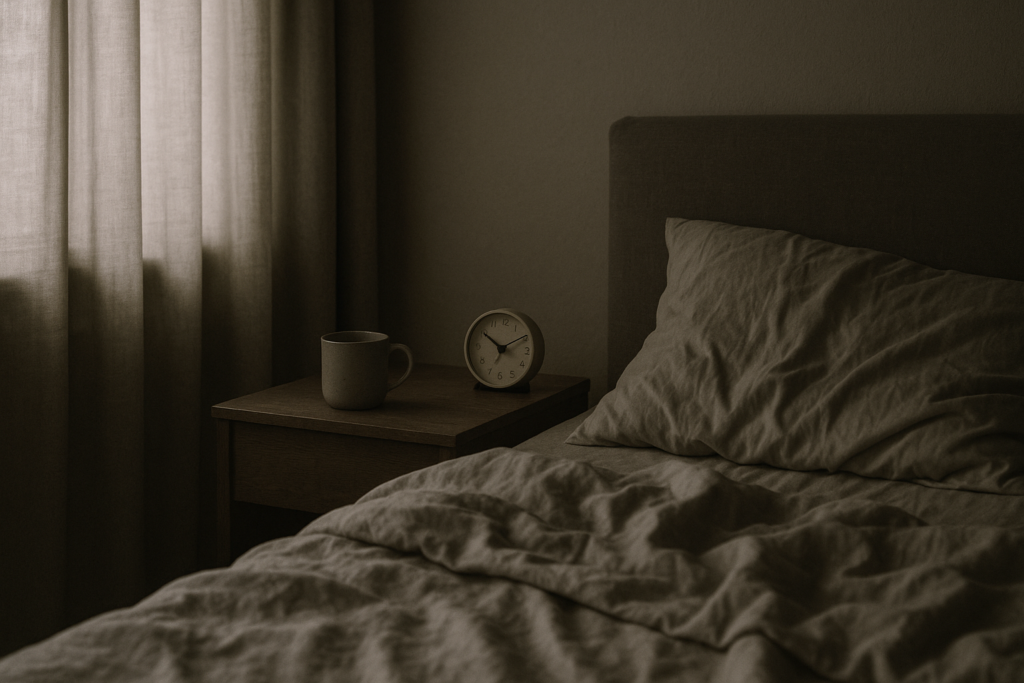
What’s Broken
There’s tired, and then there’s always tired. The kind that sticks around even when you sleep on time, eat well, and avoid obvious stressors. You wake up drained. You push through the day. Then you repeat it all without knowing what, exactly, is broken.
You’re not being lazy. You’re not weak. You’re not behind on some checklist. You’re just caught in a loop where fatigue becomes the default and no one tells you what to do when the usual fixes don’t work.
(Waking Up Exhausted)
Why It Matters
Most people don’t notice this kind of exhaustion until they crash. Not because it’s hidden but because it’s been normalized. We’re told to manage energy like a task list. We push through. Then we wonder why rest no longer feels like recovery.
But the issue isn’t that you’re missing something. It’s that you’ve added too much, for too long, with no time to come back down.
This post isn’t a cure. It’s a record of what I changed, and why it made a difference when nothing else did.
What to Ignore
- The productivity rituals that turn rest into performance.
- The wellness trends that offer more to do, not less.
- The advice that assumes you have the same body, workload, or margin as everyone else.
You don’t need motivation. You need room to breathe. And that starts by ignoring the people who never burned out telling you how to recover.
What Actually Helped
These aren’t steps or hacks. Just decisions that helped me feel like myself again.
1. Stopped Trying to Win the Morning
The advice to “win the day before 7AM” sounds good—until it turns your first hour into another pressure zone.
I stopped treating mornings like a challenge.
- Woke up at the same time daily. Not early. Just consistent.
- Started with water, not coffee. Let my body decide when it was ready.
- Dropped the guilt of not having a “routine.” I didn’t need one. I needed peace.
2. Ate Like a Person, Not a Project
I stopped planning food like it was a performance metric.
- Ate the same simple meals during the week. No daily decisions.
- Cut sugar-heavy snacks that made me crash mid-morning.
- Ate until I was full, not until a number told me to stop.
It wasn’t a diet. It was a reset, less noise, less fluctuation, fewer crashes.
3. I Didn’t Quit Coffee, I Balanced the Exhaustion Equation
I drink four to five cups a day. I still sleep well. The problem was never caffeine. It was imbalance.
Office work burns mental fuel but leaves your body idle. That creates a mismatch between a wired brain, still body, and poor sleep.
Here’s what actually helped:
- I don’t go to the gym. I clean the house. I do chores.
- I game to let my thoughts cool down, not to zone out.
- I move enough to make rest a physical need, not just a time slot.
This isn’t a routine. It’s an equation: if your work is mental, your recovery needs to be physical.
(The Burnout Trap)
4. Treated Shutdown Like a Requirement
I used to end my day by “unwinding” with screens, background noise, and split attention. It never worked.
Now I shut down with intent:
- Screens off early. Non-negotiable.
- Write down the thoughts I don’t want to carry into sleep.
- Stop pretending I can rest while half-checking notifications.
I don’t treat my brain like it’ll figure it out on its own. I give it the message—clearly, and consistently.
(The Art of Doing Nothing)
5. Subtracted First. Always.
When something isn’t working, most people try to add a new habit. That never helped me.
Instead, I removed:
- Routines that caused more stress than relief
- The pressure to optimize every hour
- The guilt of skipping “good habits” when I needed space
I didn’t find peace by becoming better. I found it by doing less—and protecting what mattered.
(The Productivity Lie)
The Real Fix Was Silence
The more I chased solutions, the louder everything got. What worked wasn’t a supplement, app, or system.
It was removing the pressure to always be doing.
It was noticing that exhaustion isn’t a sign of weakness.
It was finally accepting that if I feel tired, something needs to change not be overcome.
Final Thought
I didn’t fix my life. I just cleared enough noise to start feeling it again.
I’m not optimized. I’m not “high-functioning.” I’m just not surviving on fumes anymore.
(Not Lazy. Just in Survival Mode.)
And that’s enough.

Pingback: Recharging Is Not a Reward — It’s Non-Negotiable
Pingback: Strength Training for Men Over 40: Why Usable Strength Matters More